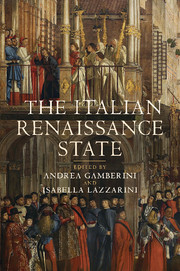Book contents
- Frontmatter
- Contents
- Notes on the contributors
- Note on translations and usage
- Map
- Introduction
- Part I The Italian states
- Part II Themes and perspectives
- 12 The collapse of city-states and the role of urban centres in the new political geography of Renaissance Italy
- 13 The rural communities
- 14 Lordships, fiefs and ‘small states’
- 15 Factions and parties: problems and perspectives
- 16 States, orders and social distinction
- 17 Women and the state
- 18 Offices and officials
- 19 Public written records
- 20 The language of politics and the process of state-building: approaches and interpretations
- 21 Renaissance diplomacy
- 22 Regional states and economic development
- 23 The papacy and the Italian states
- 24 Justice
- Bibliography
- Index
21 - Renaissance diplomacy
Published online by Cambridge University Press: 05 August 2012
- Frontmatter
- Contents
- Notes on the contributors
- Note on translations and usage
- Map
- Introduction
- Part I The Italian states
- Part II Themes and perspectives
- 12 The collapse of city-states and the role of urban centres in the new political geography of Renaissance Italy
- 13 The rural communities
- 14 Lordships, fiefs and ‘small states’
- 15 Factions and parties: problems and perspectives
- 16 States, orders and social distinction
- 17 Women and the state
- 18 Offices and officials
- 19 Public written records
- 20 The language of politics and the process of state-building: approaches and interpretations
- 21 Renaissance diplomacy
- 22 Regional states and economic development
- 23 The papacy and the Italian states
- 24 Justice
- Bibliography
- Index
Summary
Introduction
The beginnings of permanent diplomacy and the emergence of resident ambassadors have been usually associated by European scholars with growth of territorial powers in Italy between the fourteenth and fifteenth centuries: the time-scale of these developments has tended to be telescoped by historians looking for the first resident ambassadors, and their consistency and rationality have been considerably exaggerated in the search for a rather anachronistic continuity in diplomatic practices between Renaissance and modern nation-states. Since Garrett Mattingly's more accurate and systematic research into Italian diplomacy in the 1950s, a new generation of scholars has pointed out that the process was less dramatic and much more nuanced, even though resident embassies were still regarded as the key element in the transition from medieval to modern diplomacy.
In recent decades, the publication of a large number of systematically edited diplomatic records and closer attention to the mechanisms of power and legitimation within the Italian states have enabled scholars to focus on innovative approaches to the theme of Renaissance diplomacy. Riccardo Fubini has stressed that new governments’ need for internal and external legitimation caused a major change in the nature of the ambassadorial role, transforming the nuntius or proctor into a public official not limited by a strict mandate, and deeply and autonomously involved in the conservation of the state for which he acted both in prolonged and temporary assignments to mediate conflicts, achieve peace, gather information and strengthen the institutional role of his government. The prosopography of diplomatic envoys has revealed the deep link between central chanceries – that is, the heart of political decision-making – and diplomacy, and analysis of the symbiotic relations upon which the political balance of the Italian peninsula was built in the middle of the Quattrocento has shown the complementarity between diplomacy and war. In recent years, research has focused on communication networks, the crucial role of intelligence-gathering, the practices of negotiation, and the sophisticated balance between oral and written communication within a mundo de carta where letters represented the biggest part of a growing quantity of public written records.
- Type
- Chapter
- Information
- The Italian Renaissance State , pp. 425 - 443Publisher: Cambridge University PressPrint publication year: 2012
- 3
- Cited by



